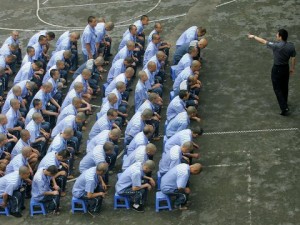Prisoners Are Subjected To ‘The Big Hang’ And ‘The Death Bed’ At China’s Notorious Re-Education Labor Camps
Business Insider
By Mamta Badkar, Nov. 15, 2013
[Note from FOFG Editor: We are very glad to see a business media outlet reporting on the Chinese Communist Party’s human rights abuses. Please note that the crimes cited in this article have been reported on a Falun Gong website, Minghui.org, since the persecution began in 1999.]
Days after China wrapped up its four-day 3rd Plenum meeting, we’re beginning to see some reforms trickle out.
Chinese state news agency Xinhua reported that China will abolish the “laojiao” or re-education through labor system that was developed in the 1950s to hold political prisoners.
China’s re-education camps are notorious for their human rights abuses. Prisoners can be held in one of 300 such camps for three to four years without trial.
People were sent to these labor camps for a range of ‘crimes’ that varied from prostitution to dissent against the Communist Party. Falun Gong practitioners have been sent to these camps. And in the case that shook the nation, Tang Hui, a mother, spent 18 months in prison for pushing for harsher punishment for the men who abducted and gang-raped her seven year old daughter.
BI’s Adam Taylor previously pointed out alleged torture tactics used in the Masanjia Women’s Reeducation Through Labor Camp in northeastern China’s Liaoning province, that was first reported by Lens Magazine.:
- “Big hang”: An inmate is hung by cuffs on her four limbs, forcing her body to stretch to its limit.
- “Small room”: An inmate is kept in solitary confinement inside a tiny room with no windows. They must do everything in this room, including urinating and defecating.
- “Tiger Bench”: An inmate is cuffed to a metal bench in a way designed to keep their legs bent upwards for a long period of time. If they struggle, the cuffs tighten.
- “Death bed”: An iron or wooden board to which the inmate is attached if they try to go on hunger strike. The inmate is stripped naked and force-fed — there is a hole in the “bed” for urinating and defecating.
- “Force-feeding”: Perhaps this one seems self-explanatory, but the detail of the report is horrifying. Prison guards reportedly use a cervical speculum to open the mouth of the inmate for food. The cervical speculum is left in the mouth ’til the next meal.
Here are two personal accounts of torture from Masanjia published verbatim from Chinascope:
Example one:
The 2010 United Nations Report submitted to Manfred Nowak, the United Nations Special Rapporteur on torture and other cruel, inhuman or degrading treatment or punishment, included the following description in his 2010 Report:
“On 2 September 2008, Mr. Yu’s term was extended for another year. He was sent back to Masanjia Forced Labor Camp in October, and has been held in solitary confinement since then. At the camp, Mr. Yu was forced to sign a suicide letter before he was beaten, including on his head with a steel baton, hung and shocked with electric batons. As a result, he bled severely and lost consciousness for more than a week. Repeated requests by his family to visit him have been denied.”
Example two:
On June 4, 2002, without any legal recourse, cause, or documentation, Ms. Wang was taken to Masanjia Forced Labor Camp.
During the day, more than four collaborators participated in the torture of Falun Gong practitioners. They interrogated Ms. Wang and tried to force her to give up practicing Falun Gong. They made her squat, remain in a kneeling position, or stand still for a very long time. Typical torture methods included hanging her up by her hands, which were handcuffed behind her back, or forcing her to stand still or squat for a long time. Another time, two guards from Benxi, holding electric batons, shouted, “We will see who is tougher!” The two men tore Ms. Wang’s shirt open and shocked her breasts with two electric batons for 30 minutes. Afterwards, they made her stand still for the entire night. Her breasts were disfigured and became infected. Finally, Ms. Wang gained her release. Later her family found out that the Masanjia camp staff believed that she had only two months to live.
Among other reforms, China will also reduce the number of crimes subject to the death penalty. Approximately 4,000 people are executed annually in the country and a number of those executed are white collar criminals.
Today’s announcement also pointed out that “lawyers will play an important role in protecting the legal rights and interests of citizens and corporations in line with the law.”
But not everyone thinks this is definitive enough.
“While abolishing the RTL system is a big step in the right direction, the reality is that the authorities are finding new ways to punish the same types of people, including sending them to other types of arbitrary detention, such as the so-called ‘brain washing centers’ and ‘black jails’,” Amnesty International said in a release.
“Without a fundamental change in policies that drive the punishment and targeting of individuals such as petitioners, human rights activists and Falun Gong members, there is the very real risk that the Chinese authorities will abolish one system of arbitrary detention only to expand the use of others.”
We will have to wait and see if China finally is heading towards rule-of-law.
Related article: For Labor Camp Prisoners in China, Closure Announcement Is Bad News

